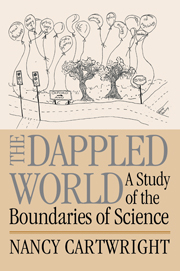Book contents
- Frontmatter
- Contents
- Acknowledgements
- Introduction
- Part I Where do laws of nature come from?
- Part II Laws and theier limits
- 4 Aristotelian natures and the modern experimental method
- 5 Causal diversity; causal stability
- 6 Ceteris paribus laws and socio-economic machines
- 7 Probability machines: chance set-ups and economic models
- Part III The boundaries of quantum and classical physics and the territories they share
- Bibliography
- Index
6 - Ceteris paribus laws and socio-economic machines
Published online by Cambridge University Press: 05 June 2012
- Frontmatter
- Contents
- Acknowledgements
- Introduction
- Part I Where do laws of nature come from?
- Part II Laws and theier limits
- 4 Aristotelian natures and the modern experimental method
- 5 Causal diversity; causal stability
- 6 Ceteris paribus laws and socio-economic machines
- 7 Probability machines: chance set-ups and economic models
- Part III The boundaries of quantum and classical physics and the territories they share
- Bibliography
- Index
Summary
Why ceteris paribus laws are excluded from economics
Economics, we are told, studies laws that hold only ceteris paribus. Does this point to a deficiency in the level of accomplishment of economics; does it mean that the claims of economics cannot be real laws? The conventional regularity account of laws answers ‘yes’. On this account a theoretical law is a statement of some kind of regular association, either probabilistic or deterministic, that is usually supposed to hold ‘by necessity’. The idea of necessity is notoriously problematic. Within the kind of empiricist philosophy that motivates the regularity account it is difficult to explain what constitutes the difference between law-like regularities and those that hold only by accident, ‘nonsense’ correlations that cannot be relied on. I shall not be primarily concerned with necessity here; I want to focus on the associations themselves.
As I have rehearsed in chapter 3, empiricism puts severe restrictions on the kinds of properties that appear in Nature's laws, or at least on the kinds of properties that can be referred to in the law-statements we write down in our theories. These must be observable or measurable or occurrent. Economists are primarily concerned with what is measurable, so that is what I shall concentrate on here. It also restricts the kinds of facts we can learn. The only claims about these quantities that are admissible into the domain of science are facts about patterns of their co-occurrence.
- Type
- Chapter
- Information
- The Dappled WorldA Study of the Boundaries of Science, pp. 137 - 151Publisher: Cambridge University PressPrint publication year: 1999



